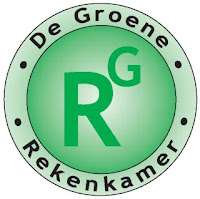As mentioned many times on this blog, climate skepticism often is associated with libertarian thinkthanks and organisations.
As we will see, this is not only true in the English speaking part of the world, but also in the Low Countries.
There are several organisations denying man-made climate change, but the first one i want to mention is the More Freedom Foundation (in Dutch :
Stichting Meer Vrijheid) : The discours used towards environmental issues is just what one would expect to hear from a libertarian movement.
Think of any cliché and it can be found in their
environmental statement :
We think the existance of large environmental risks like the greenhouse effect, acid rain or the hole in the ozone layer are exaggerrated.
(...)
We think some environmental regulations are unnecessary and are nothing but a result of a hatred against economical growth & technology.
(...)
MoreFreedom thinks environmental taxes aren't helping the environment, nor are they meant to do so. They are meant to finance the State Treasury; or to manipulate our behavior. (...) MoreFreedom therefore pleads to abandon all environmental taxes.
As seen very often in climate skeptical environments, MeerVrijheid's climate skepticism fits into a broader picture where other environmental issues also are dismissed, and where regulations are seen as an attempt of the state to gain more power or control over citizens. The skepticism isn't scientific, but originates from a paranoid vision twoards anything governmentlike.
Marcel Roele - The secretary
The secretary of MeerVrijheid is Marcel Roele. Roele is a politicologist who is working as a freelance science-journalist.
Roele is a rather controversial figure. To quote the Dutch wikipedia :
In his article "Our own people first"* Roele argues Hitler got his race-theory from the Jewish people. Meaning the Jewish people fell in the hole they dug themselves. Furthermore he claims it has been scientifically proven black people and women are less intelligent; and that handicapped people make mankind ill.
* in dutch it's titled "eigen volk eerst" and is controversial as this very same slogan was used for a long time by the Flemish ultra right-wing party Vlaams Blok (which nowadays is called Vlaams Belang, as the party was forced to change its name after three organisations associated with the party were convicted for violating Belgian law on racism & xenophobia).
Roele claims Africa is such a poor continent because the inhabitants simply have a low iq and that :
the national iq in african countries is 20 iq-points too low to make it possible to create a western style society.
Marcel Roele copies some of the usual arguments about climate change in
this article which repeats the "it's the sun" story.
Us knows us
Other people associated with MeerVrijheid are omnipresent
Hans Labohm who is part of the foundation's advisory board and who on a regular basis publishes his climate change nonsense on MeerVrijheid's website.
Other articles on environental issues that are published on the website are from the hand of some other people i mentioned before like Vincent De Roeck. The website was one of the four places where his
climate change is a religion, not science got published simultaneously.
On the
list of authors, we also find the name of climate change skeptics
Theo Richel and the names of some people i didn't blog about yet, like Elsevier-journalist
Simon Rozendaal who is well known in the low countries also for his skeptical articles and for this
book he co-authors with Hans Labohm and Dick Thoenes.
Another new name is Karel Beckman who in 1992 wrote the book "
the greenhouse effect doesn't exist"
And then there's
Peter van Maanen, who besides MeerVrijheid is associated with the the Belgian libertarian Murray Rothbard Instituut where he's one of the 7 people of the scientific advisory board. Also on this advisory board are two climate change skeptics i adressed before :
Jos Verhulst &
Frank Van Dun.
(to be fair : as far as i know both gentlemen have completely stopped commenting on climate change ever since i mentioned them on my blog.)
The important thing is that we start to see a pattern of, as we say in Dutch : "us knows us". From now on, the same names will keep returning over and over again.
In my opinion, with the MeerVrijheid foundation we are looking at one of the most important branches of Dutch climate change tree, because in almost every other skeptical group we there will appear one of the people mentioned above as we will see in the next parts of this post.
Yet even now my conclusion already is, as you will have already guessed, that in the low countries the same thing is valid as in other parts of the world : climate change skepticism is seldomly scientific, but is usually originating in libertarism.
Science gets attacked because it falsifies a polical worldview.
